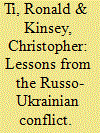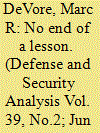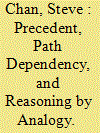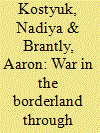|
|
|
Sort Order |
|
|
|
Items / Page
|
|
|
|
|
|
|
| Srl | Item |
| 1 |
ID:
193538


|
|
|
|
|
| Summary/Abstract |
This article examines the role of strategy in proxy wars, with the goal of identifying relevant findings to proxy wars. Comparatively analyzing Russia and the U.S.’s proxy strategies in the Russo-Ukrainian War is useful to this end – four major findings emerge. First, a state’s proxy strategy is dependent on variables unique to that state, and those of the available proxy. Second, proxies – the actual individuals or groups – are not singular in their characteristics. A proxy’s uniqueness contributes to the range of options it provides its principal. Third, proxy strategies are not fixed. The range of proxy strategy options available to a state reflects the combined uniqueness of the principal and the proxy. Lastly, in proxy wars, concerns of conflict escalation might be a thing of the past. These points make an additive contribution to both strategic and proxy war scholarship by providing a useful examination of comparative proxy strategies.
|
|
|
|
|
|
|
|
|
|
|
|
|
|
|
|
| 2 |
ID:
192604


|
|
|
|
|
| Summary/Abstract |
A commonly held view amongst strategists is that strategy leads logistics, and that military logistics, which is the science of sustainment and replenishment, is generally subordinate. The authors of this article contend that in fact the opposite is often true, that logistics frequently has primacy over strategy, and that it is the success or failure of logistics at lower levels of war which exerts the greater effect. The authors illustrate their arguments on this nexus between logistics and strategy, with examples from the current Russo-Ukrainian conflict highlighting how Russian logistic failures have contributed to failure of the strategic plan.
|
|
|
|
|
|
|
|
|
|
|
|
|
|
|
|
| 3 |
ID:
192528


|
|
|
|
|
| Summary/Abstract |
International relations theory has long suggested that uncertainty during militarized crises pushes states to adopt escalatory behavior. However, the leadup to the Russo-Ukrainian War challenges this view, with Kyiv downplaying the risk of conflict and adopting a cautious foreign policy. I argue that Ukrainian behavior in the leadup to the war demonstrates the need to disaggregate between types of uncertainty. While uncertainty over an adversary’s intentions and capabilities can push a state to adopt escalatory behavior, uncertainty regarding a potential adversary’s military strategy and regarding the level of support it can expect from third parties incentivizes a state to assume a more cautious posture. The piece concludes with a reflection on disciplinary blind spots regarding the impact of uncertainty on state decision-making and offers suggestions for overcoming them.
|
|
|
|
|
|
|
|
|
|
|
|
|
|
|
|
| 4 |
ID:
189567


|
|
|
|
|
| Summary/Abstract |
Russia’s grand military strategy has a distinct maritime bent, the Ukrainian south coast is Russia’s most tangible strategic prize, and naval forces are crucial to holding it. Since the war’s beginning, Ukraine’s carefully planned strategy has applied stress to key elements of Russia’s maritime strategy, and Ukraine’s theory of victory is shaped by maritime considerations as thoroughly as Russia’s.
|
|
|
|
|
|
|
|
|
|
|
|
|
|
|
|
| 5 |
ID:
190874


|
|
|
| 6 |
ID:
187984


|
|
|
|
|
| Summary/Abstract |
This essay addresses the strategic implications of the Russo–Ukrainian War as it pertains to relations between China and the US, especially with respect to how this conflict may inform prospective developments across the Taiwan Strait. I pursue this question under three topics: the influence of precedents, path dependency, and reasoning by analogy. The war in Ukraine has interrupted Washington’s intention to pivot to Asia to focus on containment of a rising China, and it has also caused Moscow and Beijing to align more closely. Finally, it may have made the direct military intervention of the US in a possible future crisis involving Taiwan less likely.
|
|
|
|
|
|
|
|
|
|
|
|
|
|
|
|
| 7 |
ID:
189760


|
|
|
|
|
| Summary/Abstract |
Andrew Wierzbicki comments on the Russo-Ukrainian War and advocates unequivocal backing for Ukraine from its Western supporters.
|
|
|
|
|
|
|
|
|
|
|
|
|
|
|
|
| 8 |
ID:
192529


|
|
|
|
|
| Summary/Abstract |
When Russia amassed troops in the winter of 2021–2022, many analysts deemed a large-scale invasion of Ukraine unlikely. Surveying the expert literature, we establish that these arguments largely relied on utility-based reasoning: Analysts thought an invasion was improbable, as it would foreseeably entail massive costs for Russia, its people, and its regime. We show that this regnant expert opinion had not sufficiently accounted for the Russian regime’s tendencies to increasingly accept risks, coupled with an inadequate processing of information on Ukrainian and Western views and policies. We argue that analysts miscalculated partially because the most prominent facts, long-term trends, and causal mechanisms available to them jointly suggested Russian cost-sensitivity, but provided only weak signs of countervailing factors. We thereby showcase that good forecasting requires explicit theory with a view on multiple interacting causal factors, area expertise and Socratic humility on the extent, context and certainty of our findings.
|
|
|
|
|
|
|
|
|
|
|
|
|
|
|
|
| 9 |
ID:
186559


|
|
|
|
|
| Summary/Abstract |
Prior to the onset of Russia’s invasion of Ukraine, experts predicted an extensive cyber conflict. However, to date the scale of known cyberattacks has been quite modest. Pundits suggest that Ukraine’s improved cyber defenses, which it developed through its close cooperation with Western partners, is one of the possible explanations for Russia’s limited cyber front. This article interrogates this claim, outlining two plausible reasons for the limited effectiveness of Ukraine’s cyber defenses in the Kremlin’s limited cyber front. First, despite an extensive outpouring of cyber knowledge and expertise from the West, Ukraine’s cyber capabilities are still organizationally and operationally underdeveloped. Second, limited fungibility of cyber capabilities complicates interoperability between any joint operations and diminishes the West’s willingness to share their time-limited cyber tools with Ukraine. By explaining the challenges of interstate cooperation in the cyber domain, this article contributes to the literature on the role of alliances in modern warfare.
|
|
|
|
|
|
|
|
|
|
|
|
|
|
|
|
|
|
|
|
|